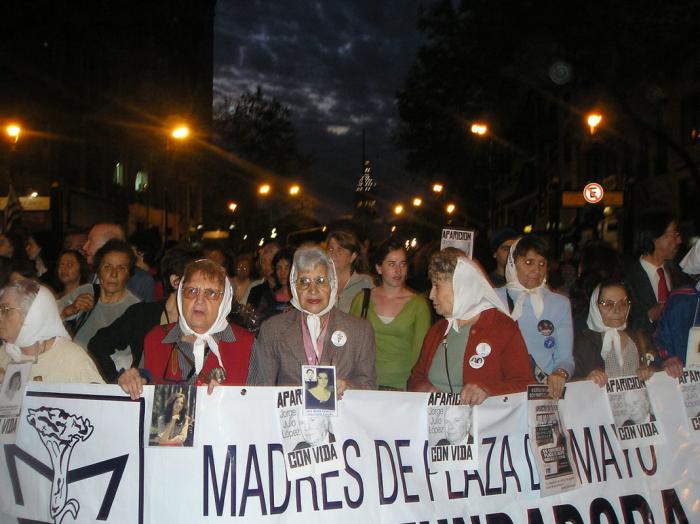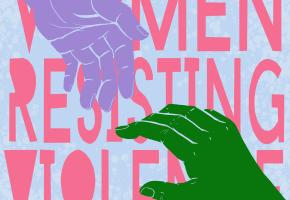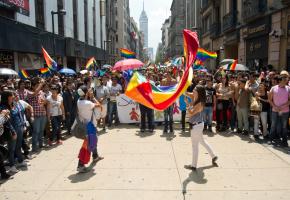By the end of April 1977 the military dictatorship that called itself the ‘Process of National Re-organization’ had been in power in Argentina for over a year. During that time all political and trade union activity had been suspended. The junta declared war on what it termed ‘subversives’ – mostly young people in organizations fighting to change the system either through a revolution or by more peaceful means.
The Argentine armed forces had resolved not to put any of these people on trial for alleged offences. Instead, they were illegally abducted, tortured, and then killed. Between 9,000 and 30,000 Argentines ‘disappeared’ as a result. The military rulers never acknowledged that this was a tactic in their ‘dirty war’ and never gave the names of those who had died.
But at the end of April 1977, fourteen brave women whose children had vanished in this way challenged the authorities by walking in the main Plaza de Mayo square in front of the presidential palace in Buenos Aires. They were demanding to know what had happened to their sons and daughters, and wanted them ‘to appear alive’. They realized that it if they joined together and campaigned in whatever way they could, they were more likely to make their cause known and perhaps receive answers from the authorities.
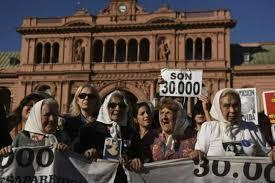
The founders of the group were soon joined by tens and then hundreds more women, who met every Thursday in the Plaza de Mayo and walked round and round in pairs, wearing white scarves round their heads. Another group, ‘the Grandmothers of the Plaza de Mayo’ was soon set up to try to discover what had happened to the more than 500 children born in captivity and often adopted by military personnel without knowing who their true parents were. The mothers themselves were threatened, and in December 1977 the notorious Alfredo Astiz (nicknamed ‘The Angel of Death’) was responsible for the kidnapping of three of the group, one of whom never re-appeared.
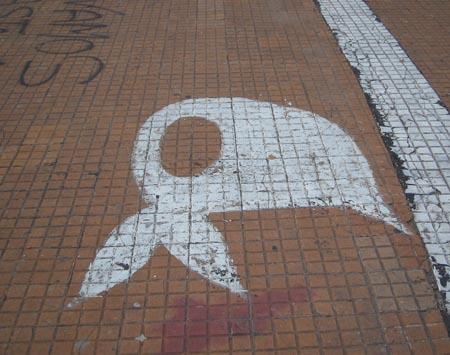 The white dove symbol of the Madres.
In spite of this, the mothers continued their weekly marches. The military junta did not know what to do with them, apart from dubbing them ‘the madwomen of the Plaza de Mayo.’ While the dictatorship lasted, they never met with them or gave any details about their children. It was only after Argentina’s return to civilian rule in 1984, under President Raúl Alfonsín, that some of the truth gradually and grudgingly emerged at the trials of the military junta leaders.
The white dove symbol of the Madres.
In spite of this, the mothers continued their weekly marches. The military junta did not know what to do with them, apart from dubbing them ‘the madwomen of the Plaza de Mayo.’ While the dictatorship lasted, they never met with them or gave any details about their children. It was only after Argentina’s return to civilian rule in 1984, under President Raúl Alfonsín, that some of the truth gradually and grudgingly emerged at the trials of the military junta leaders.
The mothers continued to press their demands, although in 1986 one of the original founders of the movement, Hebe de Bonafini split from the group and formed her own ‘Association of the Mothers of the Plaza de Mayo’ with a broader political agenda.
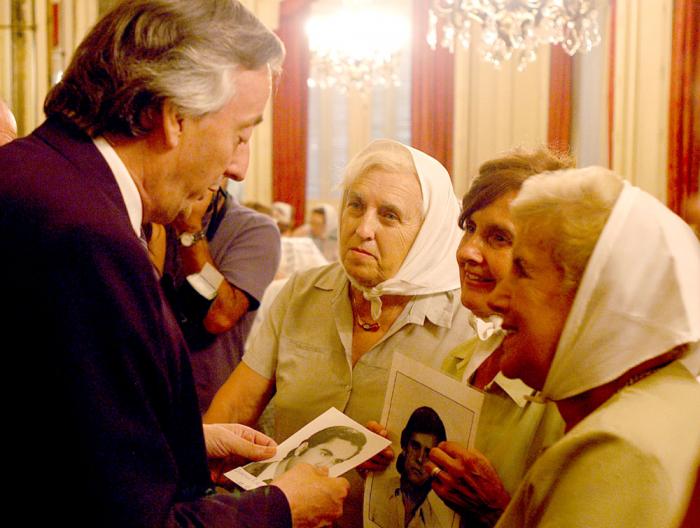 Mothers with President Nestor Kirchner
Mothers with President Nestor Kirchner
Although the Mothers had won respect inside Argentina and were well-known internationally, it was not until Nestor Kirchner and subsequently his wife Cristina Fernández de Kirchner were in power from 2003 that more progress was made to reveal exactly what had happened to the thousands of disappeared.
On 30 April 2017 the two surviving members of the original group of mothers joined with hundreds more to commemorate the fortieth anniversary of their first demonstration. Mirta Acuña de Baravalle aged 92, and 88 year-old Haydée Gastelú de García Buelas explained to the Buenos Aires newspaper Pagina 12 how the movement began.
According to Mirta, she had been to the office of the military chaplain to seek information, when she was handed a scrap of paper suggesting she go to the Plaza de Mayo the next day, Saturday 30 April 1977.
She was trying to discover the fate of her pregnant daughter Ana María, who had disappeared in August 1976, since when she had no news of her.
Reflecting on her 40 years’ odyssey, Mirta told the newspaper: ‘When you’re searching for a child you don’t calculate what you’re doing or how long you’ve been doing it. Their absence becomes eternal and so it doesn’t matter if it’s for three or a hundred years that you are searching. It’s forever.’ As yet, Mirta has not discovered what happened to her daughter, although she knows she did give birth in captivity. She has no idea what happened to her grandchild.
Haydée told a similar story. She was trying to discover what had become of her son Horacio, also picked up and ‘disappeared’ in August 1976. ‘That day I realised either I went out to find him or I died. Although I had no idea what that search, that struggle entailed, I knew that if I stayed there crying, I would soon die.’
The group has still not received answers, but Mirta and Haydée and the others remain determined to continue their demonstrations and their efforts to know the fate of their children. ‘We are not heroes,’ concludes Haydée. ‘We’re mothers looking for our children out of love.’
This was written by one of the experts at Latin American Bureau. Please support LAB's Voices of Latin America project, which collects interviews with social movement activists across the region, who fuel progressive change. Donate now to ensure that we can make their voices heard. www.crowdfunder.co.uk/voices-of-latin-america


